As Dirk Gently’s Holistic Detective Agency returns, I wanted to take a look at season one and talk about one of the elements that made it a much more emotional viewing experience than I was expecting from a fun detective show. Shortly after the first season ended, I accidentally binged the show in its entirety. I say accidentally because I didn’t expect to love Dirk when I hit play on the pilot, but by episode three, I was so enamored with the characters that I knew I was in this one to the end.
And then I watched the most recent season of Sherlock. While I loved Sherlock—especially the first two seasons—this time I found myself comparing it Dirk Gently, and I realized why I found the later episodes of Sherlock so disappointing: like a lot of the recent rash of “troubled genius” shows, the writers of Sherlock blatantly ignore and undermine the unsexy idea that actions have consequences, that if you hurt someone you should apologize (and, y’know, mean it), and that forgiveness is a difficult gift. This is a concept that Dirk Gently, for all its silliness, fully embraces.
(This post will contain spoilers for all of Sherlock and Series One of Dirk Gently’s Holistic Detective Agency.)
When Dirk Gently premiered it was compared to Sherlock relentlessly, because British TV Detective. The Guardian called it “Sherlock for the stoner set” and the actor who plays Dirk Gently, Samuel Barnett, tackled the comparison head-on in an interview with Entertainment Weekly: “For me, he’s the antithesis of Sherlock. Sherlock is all intellect, and brain, and has his mind palace. And Dirk’s got his emotional neuroses cottage.” Dirk Gently’s advertising played up the idea that this was a ridiculous, feather-light show full of oddball characters, collision courses with wackiness, and corgis. (The cast even held corgis on their laps during their 2016 New York Comic-Con panel.) The pilot is frenetic, overstuffed, and, yes, wacky. But I was surprised to realize that this show has a dark undercurrent, and a commitment to emotional realism, that make it far more interesting and weighty than the ads would have you believe.As season one unfolds, Dirk and his reluctant assistant, Todd Brotzman, form an increasingly close relationship, despite Todd’s insistence to Dirk that, “I’m not your fucking Watson!” And Todd really isn’t Dirk’s Watson, because by the end of the first arc, I would argue that he’s become something far better.
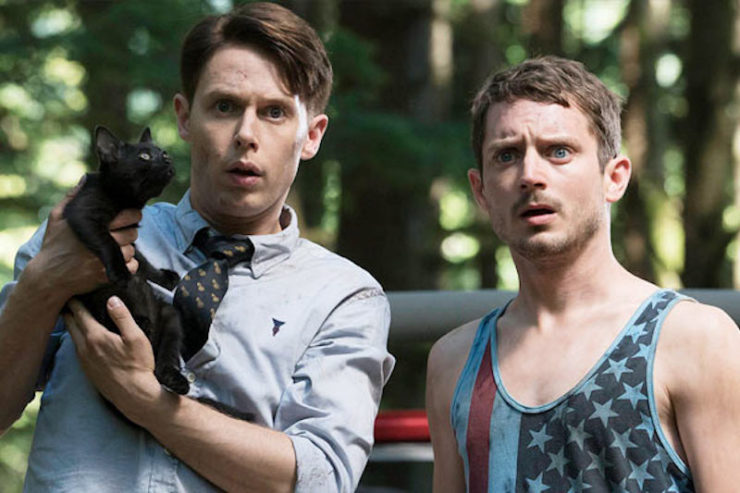
In the first series of Sherlock, a basic dichotomy was set up between Sherlock and John Watson. Sherlock was almost all brains, to the point that it honestly confused him that a woman whose baby had died would still be sad about the loss fourteen years later, and he considered it perfectly acceptable to dose himself with drug cocktails to optimize his thought processes. John, meanwhile, was all emotion—but especially all repressed emotion. He has a particular form of PTSD that’s left him so comfortable with chaos that he feels lost in the stability of civilian life, and his emotional torment manifests in his bad leg, and the occasional murder of psychotic cab driver. At the beginning of the series, these two guys are ground-level, grubby, and realistic. Their emotional beats make sense. But in season 3, Sherlock returns after a fake suicide, and things start to go off the rails.
“The Empty Hearse” initially focuses on John’s vehement physical reaction to Sherlock’s sudden aliveness, but then backs away from the idea that Sherlock should be held accountable for his actions. After rescuing John from a Guy Fawkes bonfire, the two men hunt down a bomb in an abandoned train car under Parliament. Rather than call the police, Sherlock insists they defuse it themselves. But then Sherlock, good ol’ I-never-show-emotion-unless-disdain-is-an-emotion Sherlock has an actual panic attack when he realizes he can’t defuse it, and they’re about to blow up and die. He apologizes in a way that makes John, still seething over the faked suicide, forgive his friend and call him “the best and wisest man I have ever known.”
Then Sherlock does this:
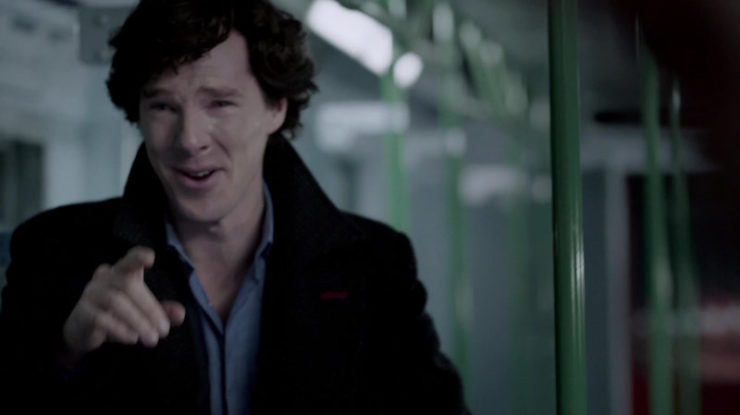
Because of course the bomb is defused, and it’s all been a gag to force John to work through his anger and grief faster. To mourn and forgive on Sherlock’s timetable, essentially. This is, again, done to John mere weeks after he was kidnapped, drugged, and set on fire. Instead of beating the crap out of him again, John actually does forgive him, sort of, and the season goes along as though the two are BFFs again… just in time for John to find out that Mary has been lying to him for years, too, which so dwarfs what Sherlock did that it’s never mentioned again.
Later, in season 4’s finale, Sherlock is forced to manipulate Molly Hooper in a way that is horrifically cruel. But rather than focusing on Molly’s feeling of betrayal, or even on Sherlock’s emotional growth via a sincere apology, the show again glosses over it and instead shows the two of them happily babysitting John’s child in the final scenes.
Sherlock is allowed to consistently get LeStrade’s name wrong, insult everyone, and crash through life bullying all the lesser mortals in his life. His relationship with John became so one-sided that even after Sherlock’s arrogance caused the death of Mary Morstan, John still found a way to stuff his rage and grief down and be Sherlock’s, well…Watson. A show that started as a quirky detective show had become just another showcase for the “tortured genius = asshole” trope.
This stood out to me all the more when I got around to watching the other quirky BBCA detective show.
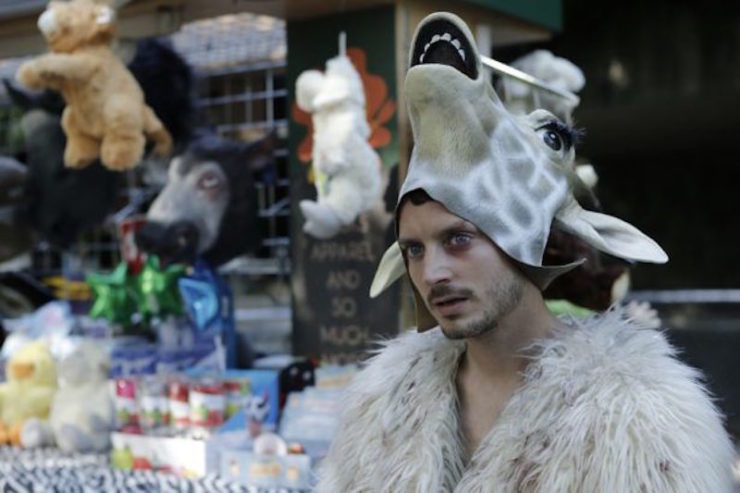
This is not an easy show to summarize, but here’s an attempt: Todd Brotzman, hotel bellhop and former small-time musician, meets Dirk Gently, Holistic Detective, at the outset of a case involving the murder of a time-traveler. Dirk and Todd have to solve the murder, steal a time machine from cultists, and save a young girl whose soul has been swapped with a corgi’s, all while dodging a group of energy vampires and a Holistic Assassin.
Todd is also trying to protect his younger sister, Amanda. A (fictional) disease called “pararibulitis” runs in their family —it gives you synesthetic hallucinations, so you might suddenly imagine that your hands are cut open and bleeding, but more than that, you feel like your hands are cut open and bleeding. Todd used to have it, but was cured. Amanda suffers from it now, and spends the season fighting its hold on her life.
As Dirk tries to force Todd to become his assistant/BFF, Todd tries to get his finances in better order so he can pay for Amanda’s care, while hiding a string of lies.
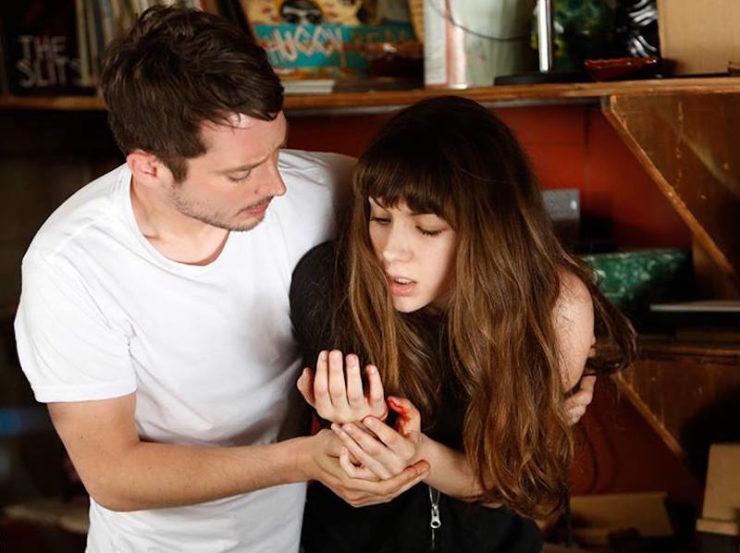
That’s a lot to process, and it’s only a small fraction of the show’s many plot threads. It could have gone horribly wrong, but as Dirk Gently unfolds, the writers chose to make emotional truth the center of each episode, until by the finale they’d built a deep bench of three-dimensional characters that I cared about, in addition to a fun time travel/mystery. Since Dirk Gently’s central ethos is “everything is connected” and the show is about a group of people who are literally working for The Universe, the writers would be justified in focusing on over-the-top crises. Instead it commits to keeping everything small and human-sized, which grounds the mystical flourishes in reality.
Halfway through Dirk Gently’s first season, we learn that Todd has been lying to Amanda—he never had pararibulitis. First he faked it so their parents would give him money, and then he had to keep up his lies until his life spun out of control. When Amanda really got the disease, he panicked and claimed he was cured, but by then their parents were too broke to help her. But Amanda’s illness gave him new direction: he redefined himself as Amanda’s caretaker and good big brother (without actually doing the hard work of owning up to his past mistakes) while secretly creating a feedback loop of guilt that has turned him into a shell of a person. Todd blurts all this out to Dirk, not as a confession, and not because he wants to change his behavior—he explicitly says that since his “recovery” is the only thing that gives Amanda hope he can’t take that away from her by telling the truth—but as a response to Dirk calling him a “good person.” Todd ends his rant by saying, “I am, and have always been, a total and complete asshole.”
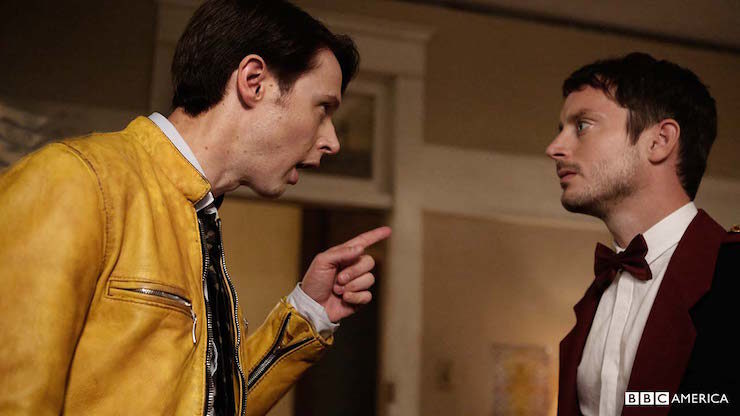
Now if this were Sherlock, the show might cut to a shot of John or Molly or LeStrade’s face looking frustrated-yet-resigned, and then we’d bounce straight into the next action sequence. But Dirk Gently takes a different course, giving us a slow, quiet scene while the two men walk through the woods together. Dirk listens, and then confesses that while he keeps up a fun and wacky front, he usually feels lost, ricocheting between hints of the universe’s inner workings as he tries to solve cases—which of course isolates him, since most people can’t handle the weird turns of his life. Finally, he tells Todd that “you’re the first person who’s actually acted like a friend” and he calls him on his bullshit:
It’s very easy to act like a jerk, and then say, “Well, I’m a jerk, so that’s that.” But it’s not like… like being a bloody werewolf, is it? It’s just you making excuses for your excuses. I don’t have any friends. I am always surrounded by bizarre and frightening states of disaster, and I am always alone. Even you keep saying you’re not my friend. But, since you’re the closest thing I’ve had, I’d really appreciate it if you’d stop calling yourself an asshole.
Todd mulls this over. The show allows a few scenes of breathing room in between the conversation and its outcome, so even though things are pretty fast-paced, we get the sense that Todd is processing his emotions in a realistic way. He finally decides to make some positive changes: first, he agrees that he’s Dirk’s friend. Then, with Dirk’s encouragement, he confesses everything to Amanda. He tells her he’s been lying to her (for at least fifteen years) and he’s really, really sorry. But before she can even deal with that, he tells her she’ll need to accept the truth quickly, because he needs her to come with him to meet Dirk so they can wrap up the time travel plot.
In a show like Sherlock, she’d punch him, or puff her cheeks out while grunting, or say “We’ll deal with this later” and then the two of them would charge out the door. Maybe there would be some huge, sweary emotional epiphany, and then they’d go save the world together. Because Amanda is Todd’s little sister—essentially the assistant’s assistant. She’s not a big tortured genius and her needs are not as important as Giant Time Travel Plot, right?
Well, no.
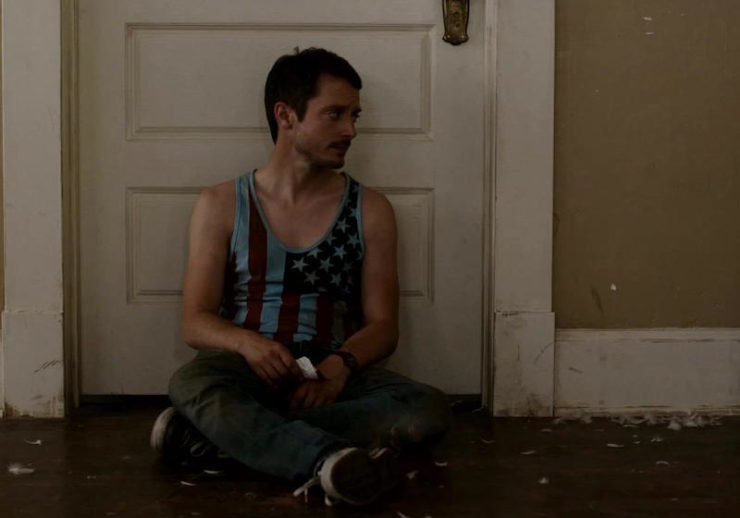
Amanda freaks out, and the show skids to a halt to focus on her. First she refuses to believe Todd, then, as she realizes he’s been deceiving her (again, for fifteen years) she locks herself in the bathroom because she can’t bear to be in the same room with him. He slumps on the other side of the door, and as they sit there, back-to-back, we cut into what may be my favorite scene in all of season one. It’s a flashback to a few years ago, when Todd and Amanda, the indie rock drummer and his cool little sister, went out to a club. Todd was rejected by a cute girl, and Amanda got in a brawl when a guy pinched her ass. The night ends with them ducking out of the fight, Amanda covered in beer and apologizing for ruining Todd’s “one night out.” Because he’s lying to her —she thinks he has pararibulitis and she’s just fucked up his night. The self-loathing shows in his face, but he also can’t bring himself to tell her the truth. Instead, he makes her laugh by dumping a beer over his head, they swap “I love yous”, and it’s clear how close they were—and how tough and wild Amanda was before the disease ground her down.
Back in the present, the show rejoins Amanda in the bathroom. The flashback has shifted point-of-view—we began in Todd’s mind, as he remembered his douchey attempt at a pick-up line, and then we moved into Amanda’s perspective, where she remembers her fight, and her brother’s goofy, awkward attempt to cheer her up. And now we sit in the bathroom with her, as she realizes that he was lying to her that night, he was lying to her every night. The person she thought she knew never existed.
Here’s where the show does something that is far more revolutionary and true than anything in the last two seasons of Sherlock. Rather having Amanda break something, or scream, or beat the crap out of Todd, she does something far worse, and much more realistic: she refuses to forgive him. He keeps saying he’s sorry, but it doesn’t matter.
She tells him he isn’t her brother.
She tells him she never wants to see him again.
And then she leaves.

The fantastic thing here is that he’s powerless. Todd is so used to being in control, spinning lies to make himself look like a good guy, while feeding on his own self loathing, that he latches onto Dirk’s holistic theories with the fervor of a convert, trying to come up with ways he can “fix everything.” Time travel is a real, workable option, so for a few scenes he thinks he’ll use the time machine to go back and resolve things with Amanda, and it seems like that might be feasible. But what’s the real plan—is he going all the way back to college to tell himself not to lie? Because that would completely change the future. Is he going to tell the truth her earlier? She’ll still be crushed. No time machine can fix the web of problems he’s caused, and he just has to wait and hope she’ll forgive him eventually.
Dirk, meanwhile, gets quieter and quieter. Flung into the past by the time machine, the duo head to Todd’s hotel to try to stop the murder before it ever happens. But of course, time doesn’t work that way—the murder did happen, it has to happen, or else Todd and Dirk will never meet at all. Once they get to the hotel Todd discovers that Dirk’s “psychic” talents have a slightly more prosaic source: as Todd watches in dawning horror, Future Dirk grabs Past Dirk and gives him clues about the case, and finally points at Todd and tells Past Dirk how to find him.
Todd realizes that Dirk has been manipulating him the entire time.
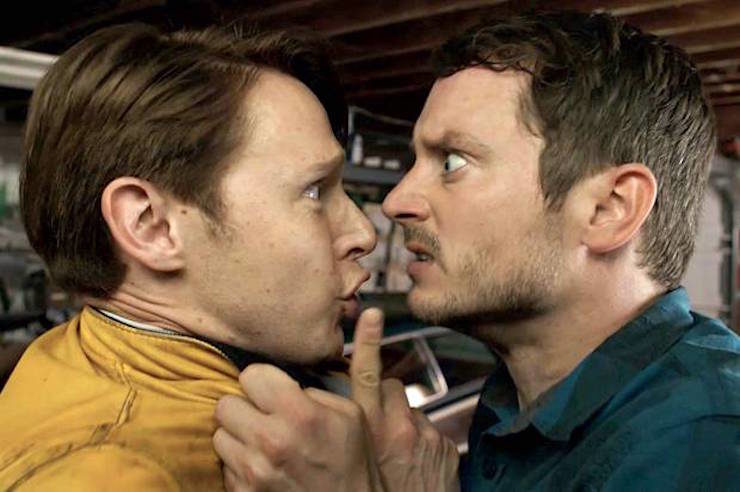
Todd mirrors Amanda’s reaction, calling Dirk a “monster” and telling him that after they solve the case, he never wants to see him again. Antics ensue, Dirk gets shot and Todd gets electrocuted (long story) and Dirk apologizes to Todd, saying that he only engaged in “strategic no-truthing” for the good of the case. Of course, there’s also the element that Dirk has never had a friend before, and wants Todd to stick around in much the same way that Todd wanted Amanda to love him, but the show handles this pretty delicately. More than that, it shows that Dirk, beneath his facade of cheeriness, was also willing to manipulate someone—but unlike Todd, he understands that there will be consequences for it. He’s hoping Todd will forgive him, but he had to weigh that desire against saving the girl (who’s trapped inside a corgi), and decided that losing his only friend was a risk he had to take.
The next day, with Lydia Spring saved, the time crisis averted, and Dirk in the hospital, Todd awakens to Amanda dumping a beer on his head. Nope, she hasn’t forgiven him. But she is willing to point out that, given that he’s a 33-year-old unemployed former bellhop with no friends, maybe he should realize that Dirk came into his life for a reason, and gave him purpose? And that even if she isn’t ready to forgive him just yet, he should go find Dirk and try to repair their friendship. Then she’s off, waving Todd’s last attempts at apologies away and giving him the finger as she walks out of his life… at least for a while.
It’s a perfect, complicated scene. Amanda doesn’t have to come back. She chooses to do it because despite everything she still loves her brother, and part of her wants to throw him this lifeline. But that doesn’t meant that she’s going to put her own anger aside to hug him, or cry, or do any of the other things most TV shows would make the wronged woman do at this point. She also, crucially, doesn’t listen to any more of his apologies. He hasn’t lived within his grief for long enough to have learned anything from it. He has nothing to offer her.
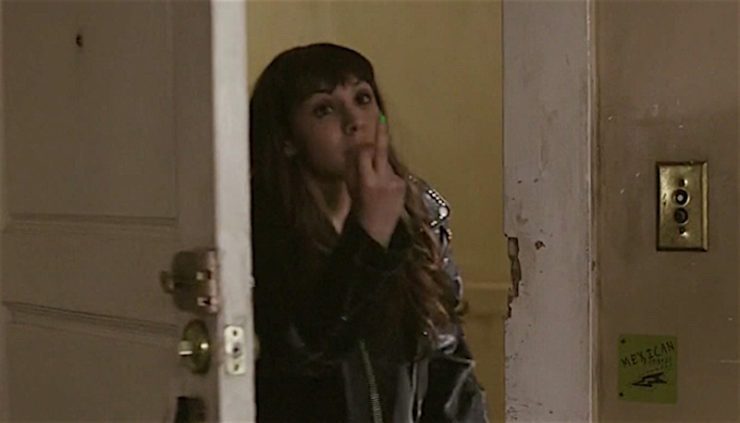
He does, however, have something to offer Dirk.
At the hospital, the detective is halfway through an anecdote about a horse when his orderly unceremoniously leaves him. Dirk is alone again, and the weight of being alone after having an friend is just starting to show when Todd turns up. Dirk is baffled, and it takes him a few heartbreaking minutes before he realizes that Todd has forgiven him for lying. The show lingers on this scene, allowing all of the various emotional threads to come together so we see that Dirk has seen and accepted Todd’s dark-ish past, and Todd has accepted Dirk’s weirdness, and that the two of them are really friends now who will call each other on their bad behavior rather than being The Wacky Genius and The Long-Suffering Assistant.
So what’s the point here? The formerly adult, brainy show has elected to use physical violence as shorthand for anger, rippling jaws as shorthand for strongly felt emotion, and has repeatedly made its main character an untouchable, unteachable superman, who tramples the emotions of everyone around him. Meanwhile, the absurdist time travel/detective show did the difficult thing of creating three-dimensional characters, who screwed up and then had to deal with the consequences of their screw-ups. This emotional responsibility wove around the time-travel plot perfectly, as we see that each new choice creates a domino effect from which there is no escape, no way to “fix everything,” no Mycroft Ex Machina. If you lie to someone for years, they might never trust you again. If you manipulate someone into being your friend, they’re going to need to think about it before the continue the friendship. And most important: you can’t force forgiveness. It’s a gift someone gives you, or doesn’t—all you can do is ask for it. By committing to a core of reality in the midst of a wacky show, Dirk Gently became more compelling than the other British TV Detective.
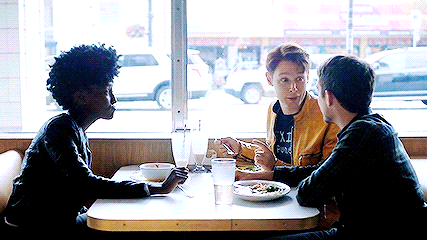
Season Two kicks off this weekend, and the new case is rumored to involve haunted houses, small towns with dark secrets, and maybe, possibly, a fantasy world with its own mystery. I cannot wait to see how the show expands its world, and follow my new favorite characters on their next adventure.
Leah Schnelbach was lucky enough to see the season 2 premiere of Dirk Gently at Comic-Con, and is bursting to talk about it. Join her squeeing over on Twitter!











Sounds like Amanda is basically saying ‘I still love you, but it’s going to take me a while to forgive you for this. I’m going away to process the fact my big brother has lied to me all my life. I’ll be back when I’m ready.’
Punching out Sherlock’s lights was a completely reasonable first reaction. It should have been followed by at least a week of slammed doors and unanswered messages before John was finally willing to listen to Sherlock’s explanations and apologies.
@1 — It goes even further than that; what Amanda says to Todd before she starts talking about Dirk is “Some things you don’t fix. Sometimes, when you fall down, you fall all the way down. You blew it. That’s just the way it is.” She does love him, or she wouldn’t be trying to help, but she’s not promising to forgive him ever. She probably will forgive him at least partially, for various reasons both emotional and plot-related, but she doesn’t have to, and the show doesn’t say she needs to.
So make that ‘I’ll be back when and if I’m ever ready.’
That note resume perfectly how i felt about that 1st season and does make me more eager to watch season 2.
A perfect summation of everything I love about Dirk Gently and everything I hated about Sherlock.
For me, Sherlock’s ability to (emotionally) get away with murder was even more irritating when he (actually) got away with murder. I had to sit down after the Season 3 finale and process the twist, and the more I thought about it, the more I thought it was so untrue to Conan-Doyle’s Sherlock Holmes that the comparison didn’t even work anymore. Someone who gets so totally outsmarted by the bad guy that he has no other choice but to shoot him in the head doesn’t deserve the name of Holmes.
Conversely, while Dirk Gently has no relationship to the Douglas Adams novels beyond the main character, I can totally buy that they exist in a shared universe.
I had basically the same reaction to the two shows – I really enjoyed Sherlock at first, but my enthusiasm for it petered out before the final season (did not bother to watch the last 2 episodes). Dirk Gently, I’d vaguely heard about, had some free time and decided to check it out… and couldn’t stop till I watched all of it. Am now really quite looking forward to season 2.
That said, there IS one thing I am not so keen about re: Dirk Gently – I guess it’s unavoidable considering the underlying plot, but I’m a little bothered about the body count. Like, a lot of people get killed. Insofar as at least some of those who get killed definitely deserved it or they wouldn’t have gotten killed, I guess that’s ok, but I half wonder if it would have been possible to have a similar show where the body count was in the single digits, say. (preferably said digit being zero).
When I saw they were making a Dirk Gently TV show I was filled with both anticipation and dread. I grew up reading with the books and I’m so used to the magic of the written word not being translated to the screen. Was so glad that this wasn’t the case here. In fact, whilst there were a ridiculous number of references to the books, the TV show told its own story with its own characters (well, obviously Dirk isn’t new, but well written, amazingly acted and an honest and true imagination of him that I think Douglas would have approved of). It felt true to the feel of the books too: that grounding in the midst of ridiculousness you (Leah) spoke of is evident in all of Adams writings.